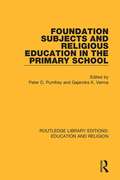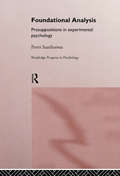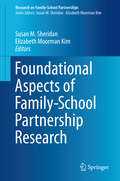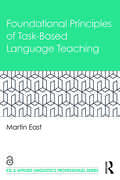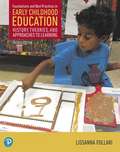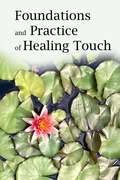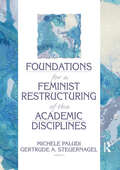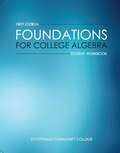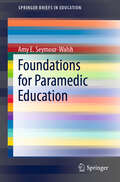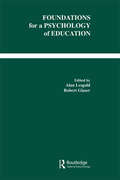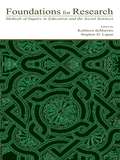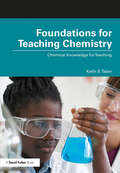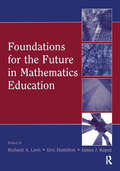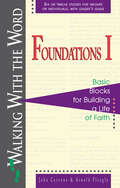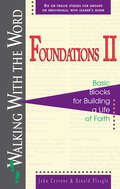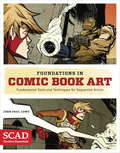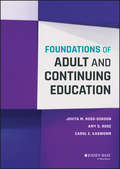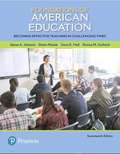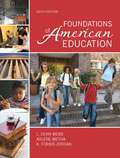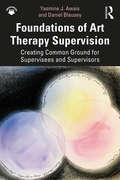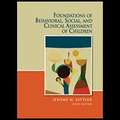- Table View
- List View
Foundation Subjects and Religious Education in the Primary School (Routledge Library Editions: Education and Religion #9)
by Peter D. Pumfrey Gajendra K. VermaFirst published in 1993. This volume brings together writings of specialists in the key components of both the whole and the basic curriculum. It sets out to describe and discuss cultural diversity and the whole curriculum from a variety of perspectives and to consider how the concerns of ethnic groups may be addressed within the framework of the national curriculum. To this end, specialists in areas of the curriculum consider some of the challenges and describe promising practices in the secondary school. Much remains undecided concerning the structure, content, pedagogy and assessment of many components of the primary-school curriculum. Despite these considerations, the multicultural nature of the population and of schools will develop. These developments and their educational implications must be considered if the educational system is to respond adequately. Although the ‘rules of the curricular game’ are still being negotiated in relation to a number of aspects of the curriculum, the editors have deliberately ventured into this controversial field. They do so because of the increasing importance of ethnic diversity of the school population and of the country.
Foundational Analysis: Presuppositions in Experimental Psychology (Routledge Progress in Psychology)
by Pertti SaariluomaIn a critical analysis of the asumptions underlying experimental psychology, Pertti Saariluoma urges social scientists to reflect upon their procedures and methodology. He has revisited the philosophy of science to find a new way of applying its methods to psychology. Foundational Analysis shows how it is possible to analyze existing methodological arguments and find loopholes in them, and raises new issues for the rationale behind empirical technique. It will be of interest to researchers and students in cognitive science and other social sciences, and the philosophy of science.
Foundational Aspects of Family-School Partnership Research
by Susan M. Sheridan Elizabeth Moorman KimThis volume focuses on how family-school partnerships are conceptualized, defined, and operationalized as well as the research that is needed to advance these foundational issues. Each chapter integrates prevailing approaches into a research-based framework for supporting learning from pre-K through high school. The book incorporates structural and relational methods into the larger context of educational processes to promote research about collaboration and to improve the academic and behavioral development of students. Diverse theories and models of family-school alliances demonstrate approaches and interventions that are goal-directed and strengths-based, respectful and responsive. In addition, the book analyzes cognitive, behavioral, and interpersonal aspects of partnership and discusses different methods of assessing parental involvement and student outcomes. Included in the coverage are innovative, agenda-setting discussions on: Definitions and conceptual frameworks of family-school partnerships. Need-satisfying partnerships. Diverse parent perspectives and participation. Measurement of family-school partnership constructs over time. Foundational Aspects of Family-School Partnership Research is an essential resource for researchers, professionals, and graduate students in child and school psychology, educational policy and politics, family studies, developmental psychology, sociology of education, sociology, and anthropology.
Foundational Principles of Task-Based Language Teaching (ESL & Applied Linguistics Professional Series)
by Martin EastThis book introduces readers to the concept of task-based language teaching (TBLT), a learner-centred and experiential approach to language teaching and learning. Based on the premise that language learners can enhance their second language acquisition (SLA) through engagement in communicative tasks that compel them to use language for themselves, TBLT stands in contrast to more traditional approaches. Accessible and comprehensive, this book provides a foundational overview of the principles and practice of TBLT and demystifies what TBLT looks like in the classroom. Complete with questions for reflection, pedagogical extensions for application in real classrooms and further reading suggestions in every chapter, this valuable and informative text is vital for anyone interested in TBLT, whether as students, researchers or teachers.
Foundations And Best Practices In Early Childhood Education
by Lissanna FollariFoundations and Best Practices in Early Childhood Education helps teachers connect early childhood education beliefs and philosophies to professional practice. It provides insights into common program models or approaches, including Reggio Emilia, Montessori, High/Scope, Head Start, Waldorf, and The Project Approach. <P><P>Real classroom stories illustrate how teachers and programs integrate child-centered approaches into actual practice. Running themes emphasize teachers' roles, views of children, inclusion, and diversity. New and experienced teachers alike will learn to define, shape, and reshape their own practices to advocate on behalf of children and families.
Foundations and Practice of Healing Touch
by Joel G. Anderson Lisa C. Anselme Laura K. Hart<P>Healing Touch is a relaxing, nurturing, heart-centered, biofield (energy) therapy.<P> Gentle, intentional touch assists in balancing physical, mental, emotional and spiritual well-being. <P>This text serves as a thorough introduction to the foundations and practice of Healing Touch to students and novices, as well as a reference and starting point for additional study for practitioners and instructors.
Foundations for a Feminist Restructuring of the Academic Disciplines
by Ellen Cole Esther D Rothblum Michele Paludi Gertrude A SteuernagelHere is a useful and illustrative guide for those interested in the impact of feminist scholarship on traditional academic disciplines. This important book explores the changes that have taken place in the academic world as a result of feminist approaches to scholarship, including issues of staffing, organization, administration, recruitment, stude
Foundations for Christian Education
by John W. Wade Eleanor A. DanielDaniel and Wade discuss the foundations for an effective Christian Education program, and tackle organizational and administrative issues involved with such a program. You will also find age specific information for all ages of learners. If you are a Christian Ed. Director, or a teacher who wants to better understand the elements of a C. E. program that will make a difference in the lives of the teachers and the students, this is the book for you.
Foundations for Paramedic Education (SpringerBriefs in Education)
by Amy E. Seymour-WalshThis book addresses the nature of professional learning, paramedic skill development, practice assessment, and feedback from both clinical and educational theory perspectives. It provides clear guidance from the literature, learning theory, and current research to help clinical educators plan robust professional education activities that address students’ learning needs and clinical practice expectations. Based on the premise that assessment of practical skills and applied knowledge is integral to paramedic education, the book presents a worked example of a validated assessment approach. Each chapter contains realistic case studies for the array of paramedic education contexts, including simulated supervision, continuing in-service education, tertiary education and formal graduate programs. All chapters include a series of questions designed to guide both individual and group-based reflection on educational practice and philosophy.
Foundations for A Psychology of Education
by Alan Lesgold Robert GlaserThe chapters in this collection illustrate how current concepts and principles from various disciplines can be viewed from the perspective of their value to educational process thinking. While not providing specific prescriptions for educational problems, the articles provide relevant experimental and theoretical knowledge has accumulated in many fields including learning theory, cognitive development, motivation, and intellectual abilities and attitudes.
Foundations for Research: Methods of Inquiry in Education and the Social Sciences
by Kathleen B. DeMarrais Stephen D. LapanDesigned for introductory research courses in the professional fields and social sciences, this text acquaints students and beginning researchers with a broad view of research methodologies and an understanding of the assumptions that inform each of these approaches. More experienced researchers will also find the book useful in acquainting them with methodologies and theoretical frameworks that are new to them. The text is distinguished by its avoidance of using the discreet categories of qualitative and quantitative methods to organize the chapters. While some chapter authors rely more on one or the other, many employ multiple methodologies to investigate particular problems and questions. Further, the book is not organized into single, contradictory positivist-interpretivist categories of research; chapter authors often situate methodologies within a variety of, and sometimes multiple, theoretical positions, particularly as these approaches are shaped by the historical context of social science research. Focus points in Foundations for Research: Methods of Inquiry in Education and the Social Sciences: *research ethics.*intertwined relationship of theory and research design. *systematic examination of ways to design and implement high-quality, trustworthy research across varying research designs. *specific methods for implementing research within various frameworks. *pedagogical strategies.
Foundations for Teaching Chemistry: Chemical Knowledge for Teaching
by Keith S. TaberChemistry is a subject that has the power to engage and enthuse students but also to mystify and confound them. Effective chemistry teaching requires a strong foundation of subject knowledge and the ability to transform this into teachable content which is meaningful for students. Drawing on pedagogical principles and research into the difficulties that many students have when studying chemical concepts, this essential text presents the core ideas of chemistry to support new and trainee chemistry teachers, including non-specialists. The book focuses on the foundational ideas that are fundamental to and link topics across the discipline of chemistry and considers how these often complex notions can be effectively presented to students without compromising on scientific authenticity. Chapters cover: the nature of chemistry as a science the chemistry triplet substances and purity in chemistry the periodic table energy in chemistry and chemical bonding contextualising and integrating chemical knowledge Whilst there are a good many books describing chemistry and many others that offer general pedagogic guidance on teaching science, Foundations for Teaching Chemistry provides accounts of core chemical topics from a teaching perspective and offers new and experienced teachers support in developing their own ‘chemical knowledge for teaching’.
Foundations for the Future in Mathematics Education
by Richard A. Lesh; Eric Hamilton; James J. KaputThe central question addressed in Foundations for the Future in Mathematics Education is this: What kind of understandings and abilities should be emphasized to decrease mismatches between the narrow band of mathematical understandings and abilities that are emphasized in mathematics classrooms and tests, and those that are needed for success beyond school in the 21st century? This is an urgent question. In fields ranging from aeronautical engineering to agriculture, and from biotechnologies to business administration, outside advisors to future-oriented university programs increasingly emphasize the fact that, beyond school, the nature of problem-solving activities has changed dramatically during the past twenty years, as powerful tools for computation, conceptualization, and communication have led to fundamental changes in the levels and types of mathematical understandings and abilities that are needed for success in such fields. For K-12 students and teachers, questions about the changing nature of mathematics (and mathematical thinking beyond school) might be rephrased to ask: If the goal is to create a mathematics curriculum that will be adequate to prepare students for informed citizenship—as well as preparing them for career opportunities in learning organizations, in knowledge economies, in an age of increasing globalization—how should traditional conceptions of the 3Rs be extended or reconceived? Overall, this book suggests that it is not enough to simply make incremental changes in the existing curriculum whose traditions developed out of the needs of industrial societies. The authors, beyond simply stating conclusions from their research, use results from it to describe promising directions for a research agenda related to this question. The volume is organized in three sections: *Part I focuses on naturalistic observations aimed at clarifying what kind of “mathematical thinking” people really do when they are engaged in “real life” problem solving or decision making situations beyond school. *Part II shifts attention toward changes that have occurred in kinds of elementary-but-powerful mathematical concepts, topics, and tools that have evolved recently—and that could replace past notions of “basics” by providing new foundations for the future. This section also initiates discussions about what it means to “understand” the preceding ideas and abilities. *Part III extends these discussions about meaning and understanding—and emphasizes teaching experiments aimed at investigating how instructional activities can be designed to facilitate the development of the preceding ideas and abilities. Foundations for the Future in Mathematics Education is an essential reference for researchers, curriculum developers, assessment experts, and teacher educators across the fields of mathematics and science education.
Foundations I: Basic Blocks for Building a Life of Faith
by John Cervone Arnold FleagleFoundations I: Basic Blocks for Building a Life of Faith - This is a basic blueprint, authored by a team whose passion for and experience in winning and discipling people is evident. Christian growth begins at the moment of conversion, but the building of a foundation is necessary to establish one's faith. Foundations I provides building blocks for consistent growth—the assurance of salvation, Bible study, prayer, witnessing, worship, fellowship and stewardship—plus a "Christian Growth Inventory" and leaders guide. This is the first book in the Walking With the Word series.
Foundations I: Basic Blocks for Building a Life of Faith
by John Cervone Arnold FleagleFoundations I: Basic Blocks for Building a Life of Faith - This is a basic blueprint, authored by a team whose passion for and experience in winning and discipling people is evident. Christian growth begins at the moment of conversion, but the building of a foundation is necessary to establish one's faith. Foundations I provides building blocks for consistent growth—the assurance of salvation, Bible study, prayer, witnessing, worship, fellowship and stewardship—plus a "Christian Growth Inventory" and leaders guide. This is the first book in the Walking With the Word series.
Foundations II: Basic Blocks for Building a Life of Faith
by John Cervone Arnold FleagleFoundations II: Basic Blocks for Building a Life of Faith — This is a basic blueprint, authored by a team whose passion for and experience in winning and discipling people is evident. Christian growth begins at the moment of conversion, but the building of a foundation is necessary to establish one s faith. Foundations II covers the topics of: the Lordship of Jesus, the Holy Spirit, the will of God, suffering, and healing—plus a "Christian Growth Inventory" and leaders guide. This is the second book in the Walking With the Word series.
Foundations II: Basic Blocks for Building a Life of Faith
by John Cervone Arnold FleagleFoundations II: Basic Blocks for Building a Life of Faith — This is a basic blueprint, authored by a team whose passion for and experience in winning and discipling people is evident. Christian growth begins at the moment of conversion, but the building of a foundation is necessary to establish one s faith. Foundations II covers the topics of: the Lordship of Jesus, the Holy Spirit, the will of God, suffering, and healing—plus a "Christian Growth Inventory" and leaders guide. This is the second book in the Walking With the Word series.
Foundations in Comic Book Art
by John Paul LoweA comprehensive guide to creating and developing comic book and graphic novel art, from the Savannah College of Art and Design (SCAD), one of the world's leaders in sequential arts instruction.John Lowe, Dean of the School of Communication Arts at SCAD, presents an in-depth primer on the tools and techniques used by top sequential artists to crate comic books, graphic novels, and other sequential art forms. Based on SCAD's world-famous sequential arts curriculum with examples of professional comic book art from their faculty and alumni, the book uses detailed instruction and step-by-step examples to teach key artistic methods like sketching, thumbnailing, reference gathering, and using production/digital design methods. This book covers all the materials and methods aspiring artists need to master to make it as sequential artists.
Foundations in Human Development (Second Edition)
by Jerry J. Bigner Troianne GraysonFoundations in Human Development is a comprehensive and engaging introduction to life span development. With a unique blend of classical studies and cutting-edge research, the reader is provided a context in which he or she is able to appreciate the historical foundations of life span development, as well as current themes and findings.
Foundations of Adult and Continuing Education
by Amy D. Rose Carol E. Kasworm Jovita M. Ross-GordonA research-based foundational overview of contemporary adult education Foundations of Adult and Continuing Education distills decades of scholarship in the field to provide students and practitioners with an up-to-date practical resource. Grounded in research and focused on the unique needs of adult learners, this book provides a foundational overview of adult education, and an introduction to the organizations and practices developed to support adult learning in a variety of contexts. The discussion also includes select understandings of international adult education, policy, and methods alongside theoretical frameworks, contemporary and historical contexts, and the guiding principles of adult education today. Coverage of emerging issues includes the aging society, social justice, and more, with expert insight from leading authorities in the field. Many adult educators begin practice through the context of their own experiences in the field. This book provides the broader research, theory, and practice needed for a deeper understanding of adult education and its place in society. Learn the key philosophical and theoretical frameworks of adult education Survey the landscape of the field through contemporary and historical foundations Examine key guiding understandings and practices targeted to adult learners Delve into newer concerns including technology, globalization, and more Foundations of Adult and Continuing Education provides an expertly-led overview of the field, and an essential introduction to real-world practice.
Foundations of American Education: Becoming Effective Teachers in Challenging Times
by James A. Johnson Diann L. Musial Gene E. Hall Donna M. GollnickEducation constantly changes-and teachers need to continue learning through professional development and educational research to improve their performance in tomorrow's classrooms. Foundations of American Education addresses the realities and challenges of teaching head on. With many new references and an emphasis on emerging trends that are impacting our schools, such as the Common Core Standards, Every Student Succeeds Act (ESSA), and social and global networking, this text encourages students to embrace new methods of instruction. Concepts are explored through current discussions of theory and practice in such critical areas as advocacy, legislation, and the current social, political, and economic climate.
Foundations Of American Education
by L. Dean Webb Arlene Metha K. Forbis JordanThe Sixth Edition of Foundations of American Education emphasizes the defining topics in education today – a diverse population, an increasingly globalized society, and the impact of standards and assessment on student learning. Explore this text to gain an understanding of how the evolution of education affects today’s teaching and learning in a constantly changing world.
Foundations of Art Therapy Supervision: Creating Common Ground for Supervisees and Supervisors
by Yasmine J. Awais Daniel BlauseyFoundations of Art Therapy Supervision serves as a reference guide for art therapists who have found themselves in supervisor roles without prior training and supervisees hoping to learn what to expect from the supervision relationship, and illustrates how to receive and provide clinical art therapy supervision. Written by two art therapists with over 35 years of collective supervision experience, this new resource includes a framework for providing effective supervision in the classroom and in the field, case studies and art-based supervisory exercises, and guidance for new professionals seeking certification or licensure. Chapters weave the authors’ supervision experience with a significant literature review, and feature explanations on how professional identities (art therapist, psychotherapist, counselor, supervisor, supervisee, administrator, educator, etc.) and personal identities (gender, race, sexuality, etc.) influence the supervisory and therapeutic relationships. This book will teach supervisees how to make the most of their experience while simultaneously providing a comprehensive reference for practicing supervisors.
Foundations of Behavioral, Social, and Clinical Assessment of Children: Sixth Edition
by Jerome M. SattlerThe Sixth Edition of Foundations of Behavioral, Social, and Clinical Assessment of Children, which also includes the Resource Guide to Accompany Foundations of Behavioral, Social, and Clinical Assessment of Children, Sixth Edition
